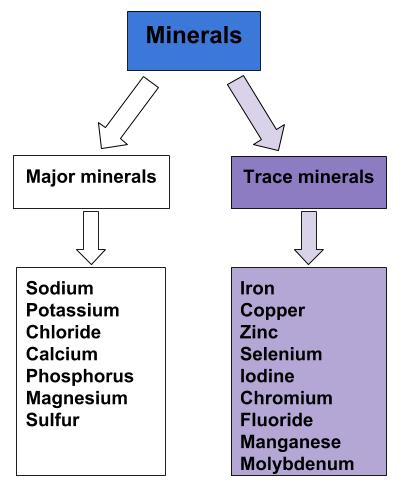11.7 – A Prelude to Trace Minerals
Learning Objectives
- Describe the functional role, intake recommendations and sources of trace minerals
Trace minerals are classified as minerals required in the diet each day in smaller amounts, specifically 100 milligrams or less. These include copper, zinc, selenium, iodine, chromium, fluoride, manganese, molybdenum, and others. Although trace minerals are needed in smaller amounts it is important to remember that a deficiency in a trace mineral can be just as detrimental to your health as a major mineral deficiency.

Iodine deficiency is a major concern in countries around the world such as Fiji. In the 1990s, almost 50% of the population had signs of iodine deficiency also known as goiter. To combat this national issue, the government of Fiji banned non-iodized salt and allowed only fortified iodized salt into the country in hopes of increasing the consumption of iodine in people’s diets. With this law, and health promotion efforts encouraging the consumption of seafood, great progress has been made in decreasing the prevalence of iodine deficiency in Fiji. The US population has had relatively stable levels of iodine since the introduction of iodized salt. However, mild iodine deficiencies have re-emerged during pregnancies in the US. The American Thyroid Association® has recommended that all U.S. women who are planning pregnancy, pregnant, or breastfeeding take a prenatal multivitamin containing 150 μg iodine per day.
| Micronutrient | Sources | Recommended Intakes for Adults | Major Functions | Deficiency Diseases and Symptoms | Groups at Risk for Deficiency | Toxicity | U.L. |
|---|---|---|---|---|---|---|---|
| Iron | Red meat, egg yolks, dark leafy vegetables, dried fruit, iron-fortified foods | 8-18 mg/day | Assists in energy production, DNA synthesis required for red blood cell function | Anemia: fatigue, paleness, faster heart rate | Infants and preschool children, adolescents, women, pregnant women, athletes, vegetarians | Liver damage, increased risk of diabetes and cancer | 45 mg/day |
| Copper | Nuts, seeds, whole grains, seafood | 900 mcg/day | Assists in energy production, iron metabolism | Anemia: fatigue, paleness, faster heart rate | Those who consume excessive zinc supplements | Vomiting, abdominal pain, diarrhea, liver damage | 10 mg/day |
| Zinc | oysters, wheat germ, pumpkin seeds, squash, beans, sesame seeds, tahini, beef, lamb | 8-11 mg/day | Assists in energy production, protein, RNA and DNA synthesis; required for hemoglobin synthesis | Growth retardation in children, hair loss, diarrhea, skin sores, loss of appetite, weight loss | Vegetarians, older adults | Depressed immune function | 40 mg/day |
| Selenium | Meat, seafood, eggs, nuts | 55 mcg/day | Essential for thyroid hormone activity | Fatigue, muscle pain, weakness, Keshan disease | Populations where the soil is low in selenium | Nausea, diarrhea, vomiting, fatigue | 400 mcg/day |
| Iodine | Iodized salt, seaweed, dairy products | 150 mcg/day | Making thyroid hormone, metabolism, growth and development | Goiter, cretinism, other signs and symptoms include fatigue, depression, weight gain, itchy skin, low heart-rate | Populations where the soil is low in iodine, and iodized salt is not used | Enlarged thyroid | 1110 mcg/day |
| Chromium | Not Determined | 25-35 mcg/day | Assists insulin in carbohydrate, lipid and protein metabolism | abnormal glucose metabolism | Malnourished children | None | Not Determined |
| Fluoride | Fluoridated water, foods prepared in fluoridated water, seafood | 3-4 mg/day | Component of mineralized bone, provides structure and microarchitecture, stimulates new bone growth | Increased risk of dental caries | Populations with non fluoridated water | Fluorosismottled teeth, kidney damage | 10 mg/day |
| Manganese | Legumes, nuts, leafy green vegetables | 1.8-2.3 mg/day | Glucose synthesis, amino-acid catabolism | Impaired growth, skeletal abnormalities, abnormal glucose metabolism | None | Nerve damage | 11 mg/day |
| Molybdenum | Milk, grains, legumes | 45 mcg/day | Cofactor for a number of enzymes | Unknown | None | Arthritis, joint inflammation | 2 mg/day |
Key Takeaways
Refer to the table above for a summary of the Trace minerals
Contributors
University of Hawai’i at Mānoa Food Science and Human Nutrition Program: Allison Calabrese, Cheryl Gibby, Billy Meinke, Marie Kainoa Fialkowski Revilla, and Alan Titchenal

